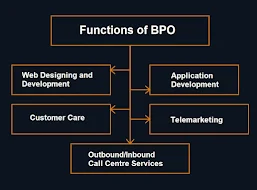What is Business Process Outsourcing ?
Business process outsourcing is a subgroup of outsourcing and it comprises of the agreement of the tasks and responsibilities of particular business function to a third party service provider. In the current context, it is mainly used to outsource corporate processing services to an external firm, or in other words, changing in-house facilities with workers from an external firm. There are various manufacturing companies, such as coca cola, which outsourced large divisions of their supply chain. BPO is the process of transferring non-core business practices to external service providers for cost saving and enriched service quality. In outsourcing, business processes are repeated and a long term agreement is used.
Basic Components of Business Process Outsourcing
The major component of a BPO model are:
1) Client: The organisation or an individual, who outsources the non-core function of the company. is known as client. Client may be the whole organisation or a unit of an organisation.
2) Vendor: The service provider who takes over and executes the outsourced process or service, is known as vendor. Vendor can be a whole organisation or a subsidiary of the organisation. Vendors can be of different types, depending upon their geographical location viz., nearshore, etc
3) Project: The outsourced processes or services are known as project.
Functions of Business Process Outsourcing
Following are some key functions of the BPO:
1) Web Development:
The current era is mostly based on computer technology and its features are mostly demanded in all BPO services. Various organisations draw benefits from websites designers who manage different web tools and software.
2) Application Development:
Companies have different software and it is very expensive to train current office staff or hire new staff, to understand and run them. In such a situation, BPO services are used by the organisation, without worrying about the training cost.
3) Telemarketing:
BΡΟ provides great advancement in the marketing area of most businesses. A BPO service provider manages a large area of marketing prospects. This gives a broader scope to the organisations market area.
4) Customer Care:
Customer service is the most popular service provided by the BPOS Companies provide this customer support to maintain the long-term customer relationship.
5) Outbound/Inbound Call Centre Services:
When BPO services are used for the advertisement of organisation's services, they are termed as outbound call centre services. In inbound call centre services, company receives the calls from the customers and solves their queries, and also at times discuss about the company's other products and services.
Working of Business Process Outsourcing
In BPO, a client fully outsources the business process or service to the service provider and then service provider executes the outsourced process or service. Quality is the most important factor and to achieve quality-service, the outsourcer and BPO vendor sign Service Level Agreement (SLA) document. The payment of the BPO vendor depends on the quality of the service; if company delivers the quality service (decided in the SLA), then BPO company receives the payment else no payment is received.
The 'BPO' and 'traditional IT sourcing' are the two different terms of services and cannot be used interchangeably. IT outsourcing deals with only some selected applications of a large business process. For example, server maintenance or any specific security application is the IT outsourced job whereas in BPO a complete process with its sub- elements can be outsourced and company focuses only on the main elements.
Types of BPO
BPO can be classified on the following basis:
1) On the Basis of Structure: On the basis of structure, BPO can be classified as:
i) Captive BPOs:
When a company has their head office in a foreign country and opens a new branch somewhere else then that company's branch is known as "captive BPO". These companies outsource the work to their parent company only. Following are the few companies who set their captive BPO in 1990s in India:
- GE
- American Express
- HSBC
Following are the some basic advantages that companies might have experienced when they developed their captives BPO in the developing countries:
- Secure the data
- Profits are obtained else that are taken by the third party vendor.
Nowadays this tendency is changed and various companies are selling their captive BPOs. For example, Philips sold its captive BPO to Infosys. It is also known as 'captive service'. The company controls its BPO services by own subsidiary.
ii) Third-party BPOs:
The foreign-based and the domestic companies outsource the work to the individual companies termed as third- party BPO. Various companies across the globe outsource the work to the third-party BPO The third-party BPO are growing rapidly and successfully in India.
Various third-party international BPOs such as WNS (a branch of British Airways), Progeon from Infosys, Mphasis, and Wipro have been established because of the dominance of captive companies like GE. American Express, HSBC and many other global corporations. Whereas the domestic market of captive companies are being broken by the BPO companies such as Aegis, InfoVision and Omnia BPO.
Below mentioned are the advantages of working with third-party BPOs:
- The monotonous work is transferred to the enthusiastic people from the developing countries.
- The companies can concentrate to the core business without worrying about the customer relationship (efficiency of the outsourced processes).
iii) Joint Venture BPOs:
Captive BPO and third party BPO combine to form a joint- venture BPO. It follows the principal of Build-Operate-Transfer (BOT) model where the facilities are owned by the client and the responsibilities of the third-party vendors are building the facilities, hiring the employees, running the operations for the time decided and after that time period transferring the operations to the client.
The client has given freedom to the service providers/labours to learn anything required as per the demand of the clients and their geographical locations (without worrying about the intricate legal and technical issues needed for the setting and running of the center). The alliance partner has responsibility of handling these issues as it has more knowledge of the surroundings. The Aviva Pic (an U.K.- based insurer) has developed alliance with three BPOs, i.e., Mumbai-based WNS Global Services, Delhi- based EXL and Bangalore-based 24x7. It was a big achievement in the BPO sector.
2) On the Basis of Services: On the basis of offered services, it can be classified as:
i) Back-Office Outsourcing:
The back-office outsourcing services are payroll, billing, logistics and human resources. Collection, credit analysis and job recruitment am also provided by few firms. The trend of outsourcing the services to the BPOs are also being adopted in the claim processing of the Insurance firms.
ii) Front-Office Outsourcing:
The front-office outsourcing performs functions like technical support, customer service, marketing and advertising. The BPO is spreading and foreign call centres are being incorporated as very important aspect. The MNCs save a large amount of money by outsourcing the customer relations to other countries like India.
Indian BPO Industry
In India, BPO started in the mid-90s and grew up by leaps and bounds. In ITES (Information Technology Enabled Services) industry, BPO is the fastest emergent segment. Following are the factors which lead to the evolution of the Indian BPO industry:
- Business risk mitigation
- Cost minimization
- Utilization progress
- Superior competency
On the basis of research of National Association of Software Services and Companies (NASSCOM) India is the world's most demanded market for the BPO industries because of the following reason:
- Low labour cost
- Talent pooled of skilled
- English speaking professionals
With the growth rate of 50%, demand of endian BPOs will be increased.
Services Offered by Indian BPO Companies
Various services are provided by the Indian BPO companies, some of them are described below.
1) Customer Support Services: It's a call center service that supports and solves the consumer's enquiries via e-mail, live chat and phone.
2) Technical Support Services: It provides de troubleshooting, installation, product support he computer software, hardware and internet structure.
3) Telemarketing Services: In this service organisation connects with the customer and creates awareness for the facilities and product. It also promotes and cross sells the current clients and helps in completing online sale processes.
4) IT Helps Desk Services: It's a level 1 and multi-channel support, office productivity took support, replying services and product usage inquiries and executing remote diagnostics.
5) Data Entry and Data Processing: Data entry from various resources such as from books paper, images, websites, etc.
6) Data Conversion Services: Aids conversion of raw data into PDF, HTML Acrobat, etc. formats and also converts data for databases, word processors, and software applications, etc.
7) Book Keeping and Accounting Service: handles the customer's general ledger, financial statements, bank assets, etc.
Advantages of Business Process Outsourcing
The main advantages of BPO are as follows:
1) Speed: BPO focuses on only one process of an organisation and it knows the finest way to execute that process So, it needs lens meetings and decussations to deploy the process. This speeding up the working process of the hiring organisation.
2) Business Risks Alleviation: Third party vendors are specialized in the field related to the process contracted by client, so they can easily analyse the risks associated with the process and make necessary procedures to remove those risks.
3) Provides Operational Support: BPO helps the companies to save the operational and recruitment cost because the hiring process of required employee and maintain the infrastructure is done by BPO organisations. BPO also ensures to provide professionals who can very well handle the technical problems.
4) Meet Constantly Changing Customer Demands: Requirements of the customers are ever changing so BPO vendors offer the management with flexible and scalable facilities to fulfil the consumer's requirements. They further support the organisations in acquisitions, joint ventures and consolidations.
5) Ability to Focus on Core Competencies: Key employees can focus more on core business process as they are free from non-core process which is done by external member which are hired by company.
6) Quality: Quality is another benefit of BPOs. The BPO vendors are specialized in a specific area and they have all the tools and staffs to render that task.
7) Saving Money: Organisations save a lot of time and cost because BPO services consist of the capability to carry out work at a significantly less time. The lower cost is achieved through minimum working cost as the workers found in most of the outsourcing destinations are less costly.
Disadvantages of Business Process Outsourcing
There are some disadvantages associated with BPO, such as:
1) Loss of Managerial Control: Outsourcing services are provided by external vendors and it is very quite infeasible to manage outside service providers. So, client loses its managerial control over them.
2) Problems of Calculating the Cost: Calculation of hidden cost incurred between two organisations is very difficult, For example, legal cost.
3) Threat to Security: There is always a problem of security, if organisation outsources services like payroll, medical transcriptions etc. it can so longer remain secured.
4) Quality Control: Some organisations always think that any job can better handle in house, so there is always a quality issue when services are outsourced.
5) Competitive Edge: To survive in this competitive edge, it is necessary for the companies to search a service provider who provide the best facilities, at the most reasonable price.

